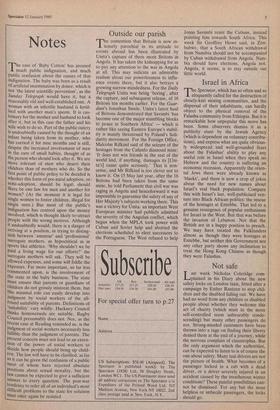Outside our parish
The contention that Britain is now in- tensely parochial in its attitude to events abroad has been illustrated by Unita's capture of three more Britons in Angola. It has taken the kidnapping for us to pay any attention to the war in Angola at all. This may indicate an admirable realism about our powerlessness to influ- • ence events there, but it also betrays a growing narrow-mindedness. For the Daily Telegraph Unita was being 'boring', after the capture, and subsequent release, 01 16 Britons ten months earlier. For the Guar- dian's Jonathan Steele, Unita's latest haul of Britons demonstrated that Savimbi 'has become one of the major stumbling blocks to peace in Southern Africa' — which is rather like saying Eastern Europe's stabil- ity is mainly threatened by Poland's Soli- darity movement. For the Foreign Office, Malcolm Rifkind said of the seizure of the hostages from the Cafunfo diamond mine: 'It does not win friends in the rest of the world Und, if anything, damages its [Uni- ta's] cause quite seriously.' That is non- sense, and Mr Rifkind is _too clever not to know it. On 15 May last year, after the 16 Britons had been taken from the same mine, he told Parliament that civil war was raging in Angola and henceforward it was impossible to guarantee the safety of any of Her Majesty's subjects working there. This was a victory for Unita: an important West European minister had publicly admitted the severity of the Angolan conflict, which began when the MPLA took power with Cuban and Soviet help and aborted the elections scheduled to elect successors to the Portuguese. The West refused to help
Jonas Savimbi resist the Cubans, instead pointing him towards South Africa. This week Sir Geoffrey Howe said, in Zim- babwe, that a South African withdrawal from Namibia should not be accompanied by Cuban withdrawal from Angola. Nam- bia should have elections, Angola not. Angola, it seems; is to stay outside our little world.






































 Previous page
Previous page